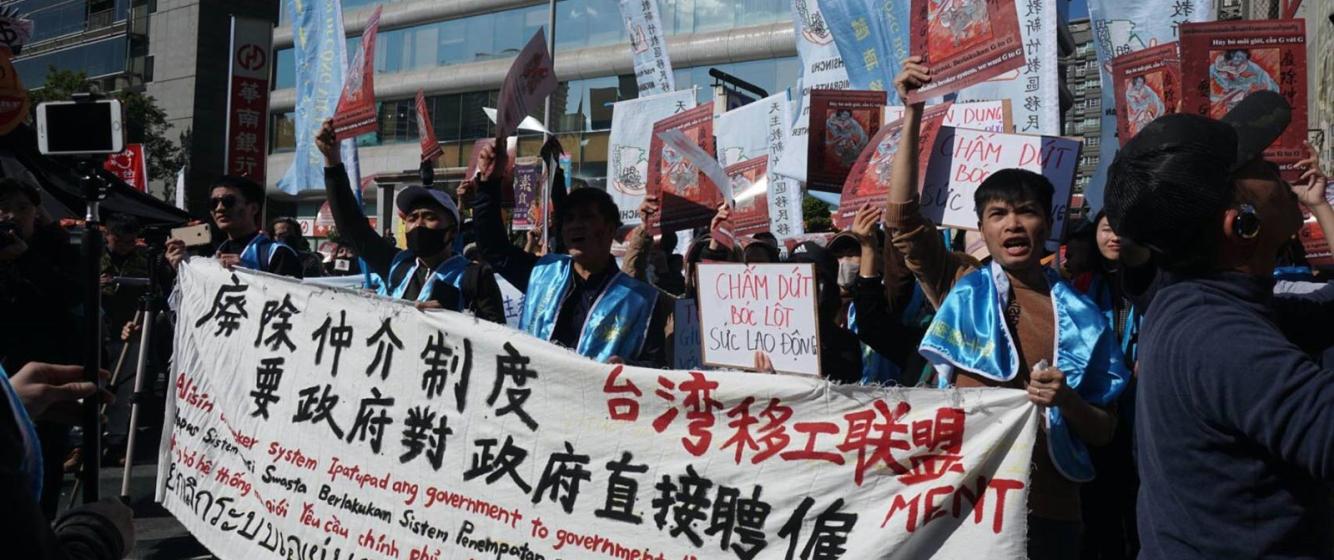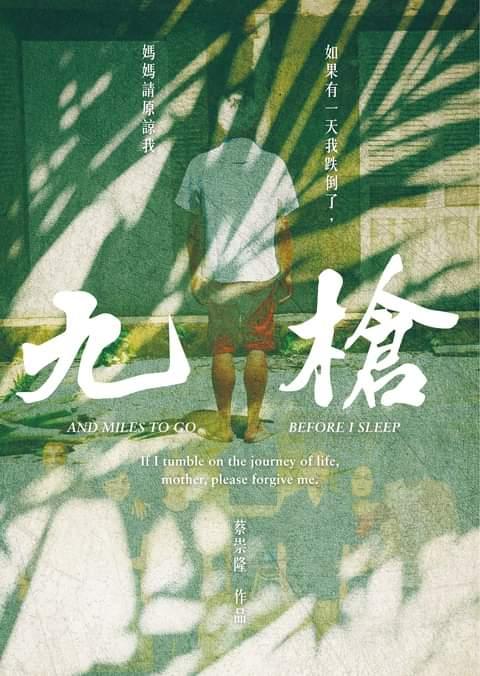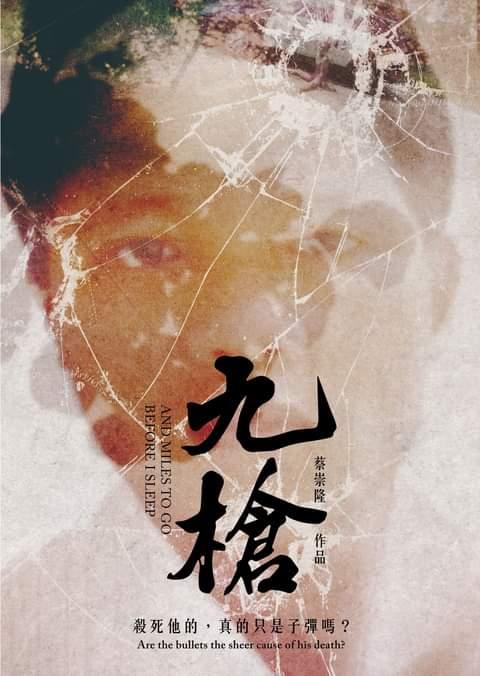
To see is to act: be a witness of the death of an undocumented migrant worker
This blog was written after And Miles to Go before I Sleep (Nine Shots九槍 in Chinese) was screened in the UK between 21st and 24th March 2023. Directed by Tsai Tsung-lung and winning the Best Documentary Feature at the Golden Horse Festival in 2022, the film was screened, with the support of Taiwan Foundation for Democracy, at the University of Portsmouth, the School of Oriental and African Studies of the University of London, Nottingham Trent University, the University of Nottingham, and the University of Central Lancashire. The following narrative was constructed by Isabelle Cockel, based on a conversation with Tsai Tsung-lung.
As shocked as everyone else was, I could not believe why and how Nguyen Quoc Phi was killed by nine shots on 31 August 2017 in Chupei, north Taiwan. I knew that when undocumented migrant workers were approached by the police on the street or raided in their workplace, they would choose to run and would sometimes end up getting injured. Some of those who were hired for illegal logging lost their lives after they escaped from their arrest. But why would Nguyen be killed by a firearm? It took me five years to edit the answers I found into And Miles to Go before I Sleep, my documentary about the circumstances under which Phi lost his life and my tribute to the contributions of more than 700,000 Southeast Asian migrant workers to the famed development of Taiwan.
What was it like when Phi was confronted by the police? This was one of the first few questions that came to my mind. Before I could think of any answers, I found that easy answers to this difficult question seemed to abound in the media. On television, every now and then, there are news reports about how undocumented migrant workers, the absconders who ‘ran away’ from their employment contracts, were arrested because of law enforcement agents’ power to stop-and-search or because of tip-offs given to them. According to these TV news reports, such ‘runaways’ looked suspicious and fugitive. Their dire attempts to escape from the police’s arrest were presented as comical, as if in an animation, or else as entertaining, as if in a reality TV show. Viewers would watch and see that, once these workers were apprehended, they were handcuffed as criminals and herded as animals, particularly during their ‘walk of shame’ to the premises of a law enforcement agency. No voiceover would tell us viewers what happened to those who jumped or fell from high up during their escape; after all, these workers were described by the voiceover as being ‘as agile as geckos.’ Is this also how law enforcement agents saw the migrant workers that they arrested? Is this also how we viewers would perceive them after watching these reports? Could it be that we viewers – fed so often and so much by these imageries and voiceovers – simply accepted what they presented because there was no other interpretation? If it is too sensational to say that we have all been ‘brainwashed’ by the media, then would it be fair to say that we were such consumers of this dominant interpretation that we did not question it anymore? Have we become bystanders who tacitly encouraged the circulation of this interpretation as if it were the truth? I decided to edit these TV news reports into my film so that viewers could see the impact and come to their own conclusions.
The number of migrant workers in Taiwan has steadily increased since 1992, when Taiwan formally recruited Southeast Asian workers for jobs shunned by Taiwanese workers. I know how they are recruited. In the film The Lovable Strangers made by me and my Vietnamese wife Nguyen Kim Hong, four Vietnamese workers leave their factories behind and find jobs on cabbage and garlic farms in the mountains. Not only were their working conditions and relationships with their factory employers poor, but their salary at the factory was also low because of the deductions made to pay back to the recruitment fees owed to their brokers. What made migrant workers vulnerable is not only this debt bondage but also the fact that they are not allowed to change their employer once they enter an employment contract. That is, they cannot change jobs freely in order to find better working conditions or a higher wage. You and I can sign up for a work contact freely with an employer chosen by us, so why can’t they?

Fig. 2: Film poster for And Miles to Go Before I Sleep, directed by Tsai Tsung-lung.
Critical information about their debt and unfreedom is mostly missing from the reality TV-like news reports. I decided to edit my interviews with recruitment brokers into my film. If I wanted to educate viewers, then they needed to know how migrant workers have become the backbone workforce that constructed expensive infrastructures like Kaohsiung MRT, No. 6 National Highway, and Taiwan High Speed Rail. Such workers also bring seafood from near or afar to our dinner table, and they also look after our families in our homes. They work in factories, some of which are as global as leading semi-conductor manufacturers, and others of which are as small as sub-contractors run by family businesses. Viewers also need to know that so many workers have lost their lives to all sorts of industrial hazards, including fire, chemical burn, or the collapse of public works that were under construction. Their employers’ cost-consciousness leads to either poorly maintained or non-existing health and safety facilities in their workplaces and living quarters that account for their injuries or deaths. Phi, like other absconders, took drugs. Interviewed brokers and forestry rangers in my film confirmed that this is common amongst male workers, whose addiction is facilitated by crime syndicates comprising unscrupulous brokers, sub-contractors, or their country fellows who act as ringleaders. Drug abuse no doubt encourages the circulation of their fugitive and criminal image; Phi and other drug abusers who lost lives during or after their encounters with the police are imperfect victims.

Figure 3: Film poster for And Miles to Go Before I Sleep, directed by Tsai Tsung-lung.
The most difficult editing decision I made for this film was to use the police officer’s bodycam footage. Viewers of my film will witness the indifference of those police officers, paramedics, and onlookers to the slow-motioned death of Phi after he was shot nine times. Phi’s silent suffering, perhaps subdued by the methamphetamine that affected his physical reaction, seemed to allow these bystanders to leave him unattended. They described to each other how he vandalised a van and a scooter, how he resisted against the police’s suppression, and how he attacked and injured a Civil Defence Corps member. They repeatedly described him as ‘aggressive’ because, after the gunshots, he was still able to throw pebbles at people. Viewers of the footage will see how the clock of the police’s bodycam was ticking away while Phi did not receive any medical attention from any of the police officers or bystanders. Instead, he was handcuffed and his ankles were shackled. He was stepped on by the police before paramedics put him on a stretcher and drove him to a hospital.
Viewers at the screening of my film often questioned whether my decision was ethical – that is, whether the display of Nguyen’s suffering and his slow death was the right choice. Because the decision was made by me, I shall be accountable for it. But my intention has always been to expose the indifference and neglect collectively shown by the people at the scene, including the police, paramedics, and onlookers. Their indifference may not be that different from how we, anonymous members of the general public, passively view abovementioned TV news that seems to be made for entertainment. Thus, I hope that when we all witness Phi’s suffering and death, we would realise how, if we continue to be bystanders rather than to take action against the exploitative recruitment system, our passivity may encourage the multiplication and perpetuation of the indifference embodied by those on the screen. After all, it could have been us, anonymous members of the public, who were among the bystanders who chose to do nothing.
Tsai Tsung-lung, National Chung Cheng University
Isabelle Cockel, University of Portsmouth
Add new comment